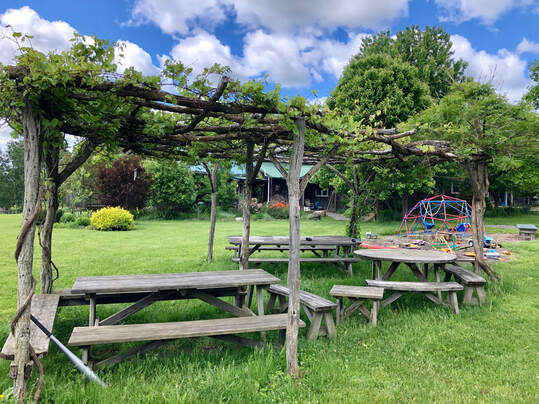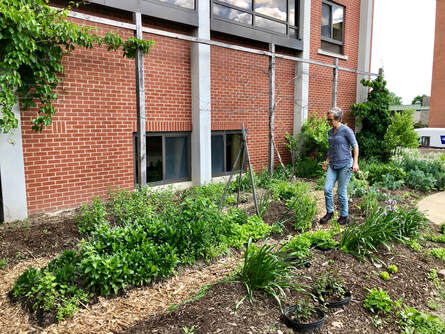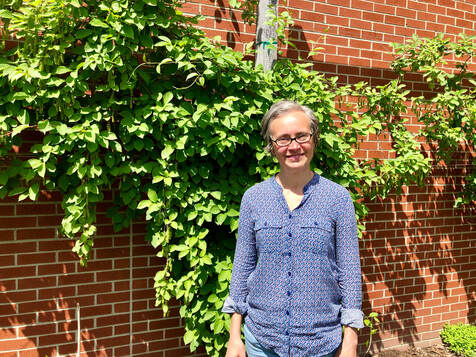SEEDS, Regenepreneurs, Ithaca College, & Finger Lakes Permaculture Institute

How can we play a more active role in reversing the degenerative patterns of inequality in gender and race within our society? What are our internal and external dialogues, and how can we shift those in a way that cultivates regeneration? In the weeks after my interview with Karryn Olson, I have been thinking through these tough yet important questions.
The people care ethic in permaculture is front and center for Karryn, where her grounding question is “how do we support, especially women, to move boldly forward as permaculture leaders and into permaculture-related careers?” This question stemmed from her personal life experiences, but especially from her role as a Permaculture Design Certificate (PDC) teacher with the Finger Lakes Permaculture Institute: “I would prep really hard…and I would feel like I would show up and I would teach a knock-out section and the comments at the end of the day would be things like ‘Karryn’s such a good mom.’” It was exhausting.
Karryn made it a goal to change this, “I really wasn’t going to the ‘it’s because I’m a woman’ or the ‘victim place’. I literally did this experiment where I tried different things for three years. First, I would prep twice as hard as the year before. My next thought was, oh, it is because I go home at night to my family. I’m going to stay, I’m going to be here at the course, so I was the first person who greeted people, and I would be there 16 hours on my day teaching. I made sure to teach really great technical content, too. Then I literally had a man make a comment to me that he was going to ask my two male colleagues a question that helped me understand he didn’t see me as a leader of the organization. It was actually a wonderful moment, because I was like ‘it’s not me!’, ‘IT’S NOT ME!’. It was so liberating.” And I kept wondering “Am I the only person going through this?’ It makes you feel crazy, it really does.”
She then put out a call out to interview 20 women about their experiences in permaculture. Across the board, difficulties were encountered ranging from sexual harassment to belittling, regardless of how incredible the women were. This was not in an effort to put down the permaculture movement, but to name ongoing degenerative patterns in our society.
Although being a good mom is a compliment, so is being a good teacher, a good leader, a knowledgeable expert. And women have a lot to bring to the leadership table. “Studies talk about [how] women are actually really even better leaders because we are better at creating alliances. When we have more diverse people at the table, women are better at bringing in people and building bridges with people who have been disenfranchised, you get more innovation when you are more diverse. All of those types of skills are super important.”
Yet, as Karryn highlights in her Permaculture Activist publication from 2013, “According to the White House Project, in their ‘Benchmarking Women’s Leadership’ report, women receive the majority of all college degrees, make up almost half of the workforce, and are well represented in entry- and mid-level positions in most sectors of the economy. However, women occupy on average only 18% of top leadership positions (and numbers are lower among women of color). Further, the wage gap for women means that they make 78.7 cents for every dollar earned by men, and that gap widens with age.” In our interview, she elaborated, “leadership, we see as an archetypically male thing. So, women are judged negatively if we are too male, and negatively if we are too feminine. We get this double whammy…micro-disadvantages.”
The solution is not in putting men down – that would be a degenerative approach. Instead, we need to be having conversations about why is this the case, and how do we change this. What are the invisible structures at play in our body language? In our internal dialogues? Our external dialogues?
 At 30%, something wonderful happens with leadership dynamics. As stated in her article, “when 30% of the people at power tables are women, organizations reach a tipping point. Women can then change agendas, inform goals, allocate resources, and impact the style in which goals are achieved. Cultural stereotypes are altered so that women are no longer seen as women, but as professionals…‘What is the landscape for women in permaculture in our circles?’ If not at parity, we can set policy to have 30% of our boards, teaching teams, speakers lists, etc., occupied by qualified women. They are out there, and we can find them by replacing the question, ‘Who do I know?’ with ‘Who don’t I know?’”
At 30%, something wonderful happens with leadership dynamics. As stated in her article, “when 30% of the people at power tables are women, organizations reach a tipping point. Women can then change agendas, inform goals, allocate resources, and impact the style in which goals are achieved. Cultural stereotypes are altered so that women are no longer seen as women, but as professionals…‘What is the landscape for women in permaculture in our circles?’ If not at parity, we can set policy to have 30% of our boards, teaching teams, speakers lists, etc., occupied by qualified women. They are out there, and we can find them by replacing the question, ‘Who do I know?’ with ‘Who don’t I know?’”
“It’s not just about how strong our skills are or how professional we are…when you try super hard over a period of time and you can’t get traction, it erodes your confidence.” So Karryn applies her skills in various ways to help others, especially women, rebuild their confidence. In addition to co-founding Finger Lakes Permaculture Institute, she teaches at Ithaca College and started SEEDS and Regenepreneurs. The following is a summary of each:
- SEEDS: Strategy, Education, & Ecological Design for Sustainability “combines coaching services with the typical consultation approach. Instead of just “dropping knowledge,” and leaving folks to struggle, Karryn works with people (often her clients are women) to deepen their understanding of design and permaculture, so they can create their own, robust permaculture design for their site, but with the support of a professional.”
- Regenepreneurs: This is Karryn’s main focus now—because in talking with women, they were doing great work but too many weren’t earning a living from it. So Karryn dove into learning all she could about entrepreneurship, and supports people to learn those skills but from a deeply regenerative approach. She does this through group programs and one on one coaching.
- Ithaca College Permaculture: Karryn designed and installed with students Ithaca College’s first permaculture garden, located near Williams Hall. She teaches the associated course Gardens, Ecological Design and Practice.
- Finger Lakes Permaculture Institute (FLPCI): Karryn co-founded this in 2005. Over the years, FLPCI has offered workshops, study groups, apprentice programs, and Permaculture Design Certificate courses, all based around sustainable and ecological design. FLPCI became a 501c3 a few years ago, and is building board capacity and focusing its efforts on an annual Permaculture Weekend.
At Ithaca college, Karryn’s 1-credit course on Gardens, Ecological Design and Practice gets students outside of the classroom. Homework involves working in groups in the gardens. In another course, students made a “business case” for permaculture on campus, given the stronghold of campus mow-blow-and-go landscaping. “We actually did the math…the average lawn mower running one hour is the equivalent to running seven cars at 55 miles an hour…then we talked about ‘what is the embedded energy of the pesticides, herbicides, fertilizers’…[referencing adjacent typical campus landscaping] all of this is put in and ripped out multiple times. They bring in huge loads of mulch and for a while, they were actually raking up all the mulch from last year and putting in new mulch. It’s kind of nuts…if we were ever to have a carbon tax, this is a liability, this approach. It’s actually a mismanagement issue.” Through this type of work, she is helping students rethink our standard mode of operating.
But it is through her newest consulting endeavor, Regenepreneurs, where she is currently dedicating the most time, excitement and energy. Karryn created Regenepreneurs as she was encountering numerous people with amazing skills, but without the know-how of how to apply those in a way that is most strategic given their life situations. “We need to fast-track regenerative solutions.”
The concept of a regenerative right livelihood is adapted from E.F. Schumacher and his work Buddhist Economics. “A lot of people are trying to figure out ‘What is my path? How do I do the good work?’ I know when I took my first permaculture course back in 1994 it was like ‘oh, I’ll become a teacher, a designer’ because that was all I saw as the possibilities and I started realizing ‘wow, you can take these skills and you could apply them in unlimited amounts of directions if you understood the entrepreneurial parts of it.” Helping others understand those entrepreneurial applications of permaculture lies at the heart of Karryn’s current work, developing “skills to co-create a regenerative future.”
Her ultimate goal? “I want people to walk away being like ‘we can do this.’ So it’s really about their own thriving, but then also having an audacious vision of what thriving could look like for our communities and our future, our kids’ futures.”
As a woman, I connect with and am touched by Karryn’s efforts, not to mention her magnetic personality. She is an inspirational leader working to shift deeply rooted degenerative paradigms. Something she said in the interview resonated deeply with me; During her undergraduate studies, a male professor walked in carrying a baby and she thought “how cool!” But then, she asked herself how she would react if it was a woman: “What, couldn’t you find childcare?” That opened her eyes about how “gender schemas” are deeply ingrained in all of us. These are hard realities to face and they are things we all in some way or another have experienced and personally furthered, and we need to be awake to it in order to set regenerative patterns for people care in our culture. These conversations and issues show the potential of permaculture beyond the landscape – fostering regenerative hope in a time where we need it most.
To discover more about Karryn, visit Regenepreneurs’ website https://regenepreneurs.com, or http://seedsustainabilityconsulting.com, or the Finger Lakes Permaculture Institute at https://fingerlakespermaculture.org

Recent Posts

